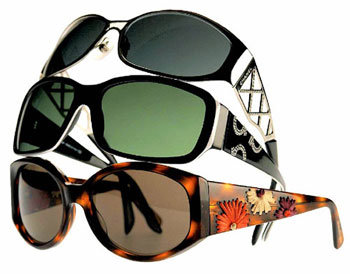Sunglasses: Good for the Eyes, Good for You
Sunglasses: Good for the Eyes, Good for You
Posted July. 18, 2005 03:09,

It is holiday season, and the sun has become hotter.
It is the time of year for sunglasses. This one small fashion accessory can make a big difference. Numbers of beautiful women with all types of colorful shades fill resort areas.
The original purpose of sunglasses is to prevent ultraviolet rays and sun glare. You must also think about eye health.
The side effects of ultraviolet light have been debated several times. In 2000, INSERM of France stated, Long-time exposure to ultraviolet light can increase the rate of cataracts four-fold. Last year, the American Academy of Ophthalmology (AAO) also recommended that people wear sunglasses without exception in case they lose eyesight.
Lightly or Untinted Lenses Are Best-
The reporting staff categorized over 10 sunglasses into brand-name, sports, customized, and low-end ones and measured each on their UV protection ratio.
The result found that brand-name and sports glasses blocked over 98 percent of ultraviolet rays. The ones from hospital optical stores blocked out 92 percent of UV rays. Low-end products purchased from regular optical stores blocked 80 percent, the lowest of all. Jang Jong-seok, an optician at Severance Hospital said, Except for defects, almost all lenses are UV-coated and thus block UV by more than 80 percent.
Regular glasses offer UV protection of 40 to 60 percent. Even general purpose glasses can provide up to 100 percent UV protection with UV coating for 10,000 to 30,000 won, he said.
The tint density does not matter as long as the lenses have UV coating, which means dark lenses do not necessarily block ultraviolet rays better. Sports glasses without colors provided 100 percent protection while dark tinted low-end ones fell short of 80 percent.
In fact, many ophthalmologists say Dim or no color lenses are optimal. The AAO had also stated earlier that Color is not important.
Instead, dark colors have low transmission ratio of visible light, so it can produce long-term side effects such as damage in vision and color discrimination ability. Moreover, without UV coating, they can absorb more UV light as the pupil dilates amid dark surroundings. Therefore, dark and primary color lenses must be avoided if possible.
Lightly-Tinted Sunglasses for Dry Eye Syndrome-
Good design must not be the single factor in choosing shades. Acryl-lenses are in many cases defective and do not block ultraviolet radiation. More than an hour of wearing such glasses can tire your eyes and give you eye pain. You must check the materials first.
There is one thing you should bear in mind when wearing sunglasses to prevent glare. Because Korean irises are black, they tend to be less sensitive to light than their Western counterparts. Therefore, sunglasses are not necessary for Koreans unless they are outdoors for a long time. The same goes for driving as well.
However, dry eyes or those with cataract symptoms can experience severe glare. In this case, you need colored sunglasses which show your eyes faintly when you look in the mirror.
Wearing purpose must also be considered. Shades must not have more than 50 percent color density if you intend to wear them while driving. It does not suit the purpose if you feel it has gotten dark suddenly on entering a tunnel.
In addition, different colors can fulfill different purposes. Sun glare can be reduced differently depending on the color by blocking long or short wave lengths. In general, green, brown, and grey are recommended for beach, driving, and outdoor activities, respectively.
Sun shades are most effective when their lenses are bigger than those of general glasses, and the rims are attached tightly to ones chins.
Sunglasses also have a lifespan which lasts around three to five years. When they near the end of their lifespan, lenses start to show fine cracks, faded color, or distortion. By then, light penetrates the broken area and causes dizziness and eye pain. That is why you have to use a well-textured cloth when cleaning the lenses.
Avoid leaving sunglasses in the car during hot summers because temperature-sensitive plastic lenses are very likely to get distorted. Always keep them in cases at a cool temperature.
(Information provided by Gwon Ji-won, ophthalmology professor at Seoul National University Hospital, and Kim Eung-gwon, ophthalmologist professor at Severance Hospital,)
Sang-Hoon Kim corekim@donga.com







